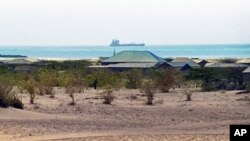The International Maritime Bureau said Monday that ship hijackings worldwide hit a five-year high during the first nine months of this year.
Captain Pottengal Mukundan is director of the International Maritime Bureau, or IMB, said, "I don't think we can take any comfort from these attacks. We have seen a new area emerge in the South China seas. In Somalia we have seen the attacks come down but the number of hijackings remain high and will, if the trend continues, be at the same levels, if not more, than it was last year."
The South China Sea suffered 30 piracy attacks between January and September of this year - that's triple the number during the same period last year. According to the IMB report, there were 289 piracy attacks in total during those nine months.
The report says Somali pirates are responsible for more than 40 percent of them.
Attacks in the Gulf of Aden, however, have gone down. Only 44 attacks have been reported this year, compared to 100 for the same period last year.
Mukundan said that doesn't mean Somali pirates have abated their attacks. "The pirates are ranging even further away than they did before into areas where they were not known to be previously operating."
Mukundan said because the pirates are traveling further afield, vessels are not always on high alert and navy patrols are not able to police such broad expanses. He said international navies that patrol the Gulf of Aden and the Somali basin are crucial in the battle against piracy.
Peter Lehr is a piracy and terrorism specialist at Britain's University of St Andrews. He said another shift in the nature of piracy is that hostages are now often held for longer than they were previously. He said he worries the situation for hostages may get worse.
"Pirates might start to threaten the lives of hostages just to speed up negotiations and get what they want," said Lehr. "Maybe that's something we can see in the future - that this piracy business will be far more deadly than it was before."
According to the report, during the past nine months guns were used in 137 incidents and knives in 66. One crew member was killed, 27 were injured, and almost 800 hostages were taken.
Somali pirates said their attacks are a defense against toxic dumping and foreign fishing trawlers, which deplete local fish stock and threaten traditional coastal fishing.
Piracy Hijackings on the Rise




